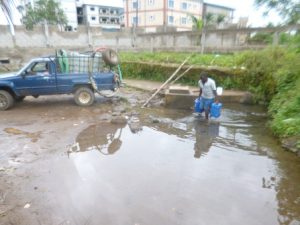There is supposed to undoubtedly exist a symbiotic relationship between humans and nature, but we have been caught in the snare of reckless environmental plundering in our insatiable quest for economic development. In fact, a Cameroonian Geography Professor and former Vice Chancellor of the University of Buea, Professor Lambi, had even postulated that “the way we are using earth’s resources over time tends to suggest that we are moving towards a resource bankruptcy and an environmental collapse”.

With the massive rural exodus and urbanization, man’s economic concerns have more than ever before relegated conservation and other elated environmental issues into the background. Economic expansion, infrastructural development and financial benefits as a whole have taken centre stage in complete disregard of man’s stewardship role for the environment.
More and more grassland and forested wetlands, which are normally supposed to be free from human occupation have been transformed into agricultural systems and dry lands with houses sprouted therein. Statistics from the Yaounde VI council for example indicates that wetlands occupy up to 7km2 of the municipality’s surface area. Within this 7km2 wetlands are about 400 houses accommodating over 2000 people. Though transformed to dry lands already, these people are more or less at the risk of floods and other natural disasters.
Worried by this status quo, Cameroon Minister of Environment, Protection of Nature and Sustainable Development, Hele Pierre, visited some wetlands within the Simbock neighborhood in Yaounde, last February 2018, and sounded a note of warning to the people of Younde VI transforming wetlands into dry lands for construction purposes. The Minister underscored the fact that such a practice is not only ecologically unfriendly but completely violates environmental laws protecting wetlands/marshy areas in Cameroon.
Another area in Cameroon, whose wetlands have gone under the sledge hammer of agriculture and infrastructural development, is Bamenda. This town, which is the Head Quarter of the Northwest Region of Cameroon, plays host to three major wetland areas including Ngomgham, Mulang and Menda-Nkwen. Research indicates that these wetlands area, which constituted up to 27% of Bamenda town in 1984, have today been reduced to less than 6% (barely 35 years down lane), due to urbanization and industrialization. The phenomenon is so disturbing that the Chairman of one of Cameroon’s leading opposition party, the Social Democratic Front, Ni John Fru Ndi and the councilors of Bamenda II and III councils, in 2017 staged a protest against the construction of an industrial outfit on a wetland in Nkwen by a business tycoon, who defiled the Government Delegate to Bamenda City Councils’ injunction against the reclamation.
The problem of wetland invasion is even more perennial in Buea and coastal towns like Limbe, Tiko and Douala. Individuals even brandish land certificates on wetlands and watersheds, which are supposed to be a common property resource.
These anthropogenic disruptions of wetlands no doubt have the propensity of inducing climatic disorders and global environmental consequences. It is certainly with this consciousness that countries the world over decided to celebrate 2019 Wetlands Day last February 2, under the theme: Wetlands and Climate Change.
Wetlands undoubtedly play a vital role in reducing climate change impact and stabilizing Green House Gas. Besides it’s preponderant role climate change mitigation, wetlands are a critical part of our natural environment and contribute enormously to reducing storm and flood impacts, controlling pests, absorbing pollutants and ensuring fresh water availability. They equally serve as a great source of primary products like agriculture, fisheries and forestry. Besides these, wetlands are great sites for tourism and recreational activities, which if well harnessed can generate income for the socio-economic development of the country. It therefore becomes very necessary for us to understand and rather build a win-win relation with wetlands and the environment as a whole, without which, the future generation will see even a much more ugly face of nature’s wrath than we are seeing today.
B. Shancho Ndimuh








This is some nice material. It took me a while to finally find this site but it was worth the time. I noticed this content was hidden in google and not the number one spot. This webpage has a ton of high-quality stuff and it doesnt deserve to be burried in the search engines like that. By the way I am going to add this web page to my list of favorites.